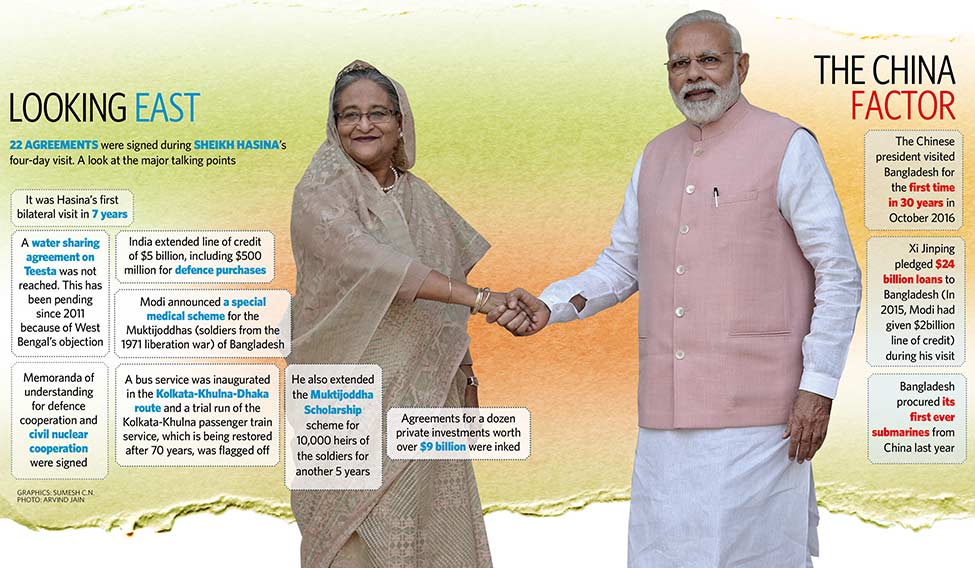Prime Minister Narendra Modi set aside protocol and went to the airport to receive Sheikh Hasina, the prime minister of Bangladesh, as she arrived in Delhi on April 7 on an official visit. President Pranab Mukherjee hosted a banquet for the visiting prime minister at the Rashtrapati Bhavan. Hasina came bearing gifts; saris for Modi’s mother and West Bengal Chief Minister Mamata Banerjee, hilsa for Pranab and Mamata, and sweets for all. Yet, the grand reception planned for Hasina in Dhaka upon her return had to be cancelled as Hasina and Mamata failed to reach an agreement on sharing the Teesta waters.
Hasina’s political rival Khaleda Zia promptly accused the PM of a “sellout” to India. Independent observers, however, termed the visit a success. “It was a successful visit in terms of optics and substance. But Teesta remains a major political issue in Bangladesh. Certainly, Hasina’s people back home would have expected India to deliver on its promise,” said Deb Mukherjee, India’s former high commissioner to Bangladesh. Modi has promised Hasina that there will be an early resolution of the Teesta dispute.
Hasina has stood firmly with India even on contentious issues like anti-terror cooperation. She has kept Islamic hardliners in her country on a tight leash. “Bangladesh is an example where our neighbourhood first policy is actually yielding results,” said foreign secretary S. Jaishankar. But, with China aggressively wooing India’s neighbours in the Indian Ocean region, India has been searching for an appropriate response. During his visit to Dhaka last October, Chinese President Xi Jinping pledged $24 billion in loans to Bangladesh, upstaging the $2 billion credit line offered by Modi a year ago. China is also the leading supplier of defence equipment, including submarines, for Bangladesh.
Following Xi’s visit, India has been working quietly to identify areas where it can deepen cooperation with Bangladesh. “As Bangladesh started drifting towards China following Xi’s visit, both India and Bangladesh were not feeling comfortable. Sheikh Hasina’s visit was a balancing act by both sides,” said Sanjay Bhardwaj, who teaches South Asian politics at Delhi’s Jawaharlal Nehru University. “Modi needed to show that he can have at least one friend in the neighbourhood, while Hasina needed to show that she was getting help from India,” said Bhardwaj.
As many as 22 agreements were signed during the visit on sectors ranging from defence to peaceful uses of nuclear energy. India offered Bangladesh a credit line of $500 million for defence purchases. Another credit line worth $4.5 billion was offered to cover areas such as port construction, railways, roads, airports, power and energy, telecommunications and shipping.
Modi and Hasina met for around 90 minutes. Their chemistry was visible. “Both leaders were satisfied with the progress. More than agreements, we have taken practical steps to take the relations forward,” said an official from the ministry of external affairs.
Both sides also tried to consolidate the emotional ties forged during the 1971 liberation war. A road in Delhi was named after Hasina’s father, Sheikh Mujibur Rahman, who is the founder of Bangladesh. Hasina acknowledged the supreme sacrifice made by 1,661 Indian soldiers, who laid down their lives in the liberation war, while Modi announced a special medical scheme under which 100 Muktijoddhas [Bangladeshi liberation fighters] will be provided medical treatment in Indian hospitals every year. He also extended a scholarship scheme for 10,000 descendants of Muktijoddhas for another five years.
The power sector cooperation has been a significant step at strengthening ties. “We are importing electricity from India through grid-interconnection. We are also collaborating in other sectors of energy namely, renewables such as solar, wind and hydro, and offshore exploration,” said Hasina. “We had asked for water, but she [Mamata] is giving us electricity. At least we got something.”






